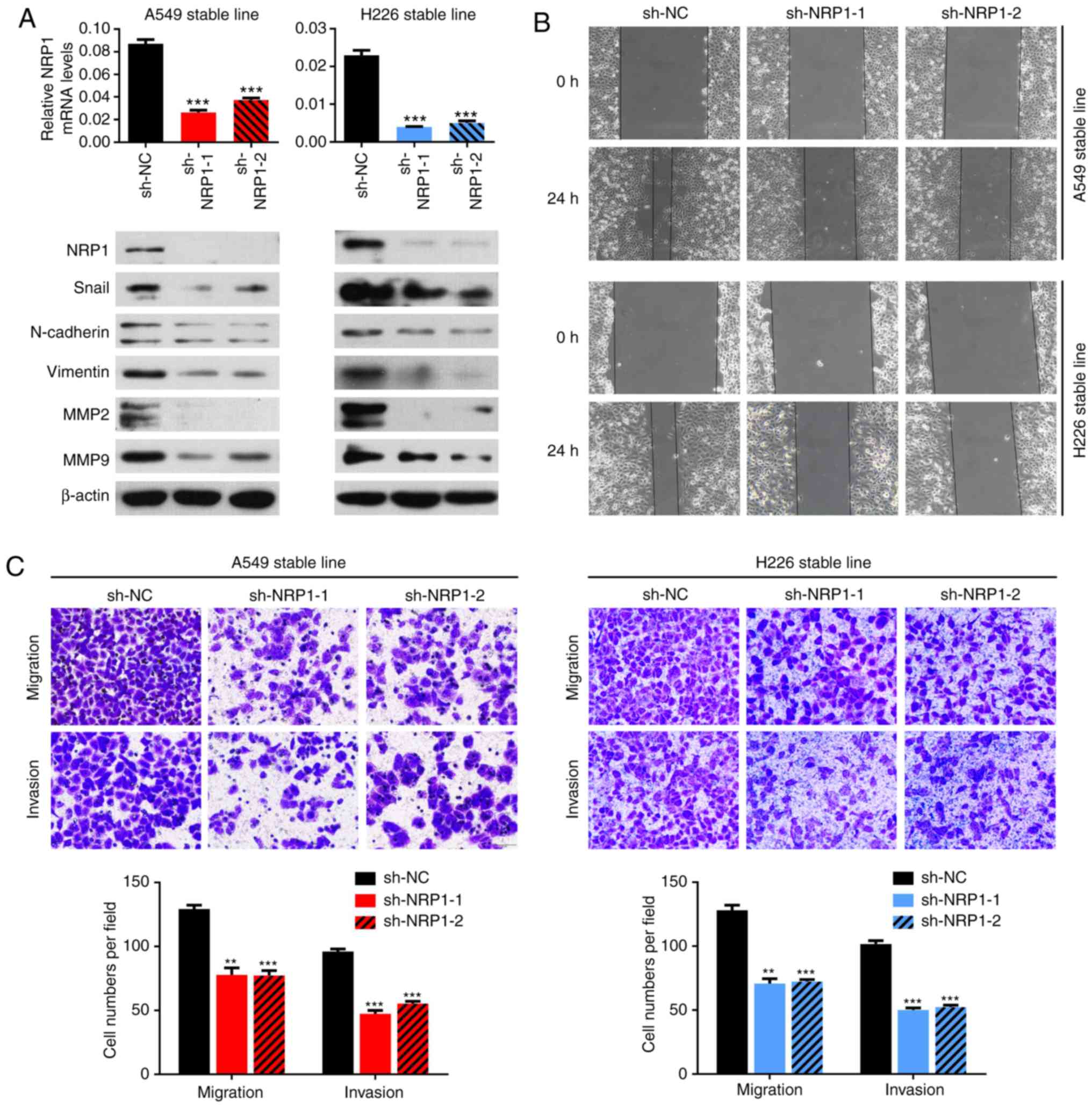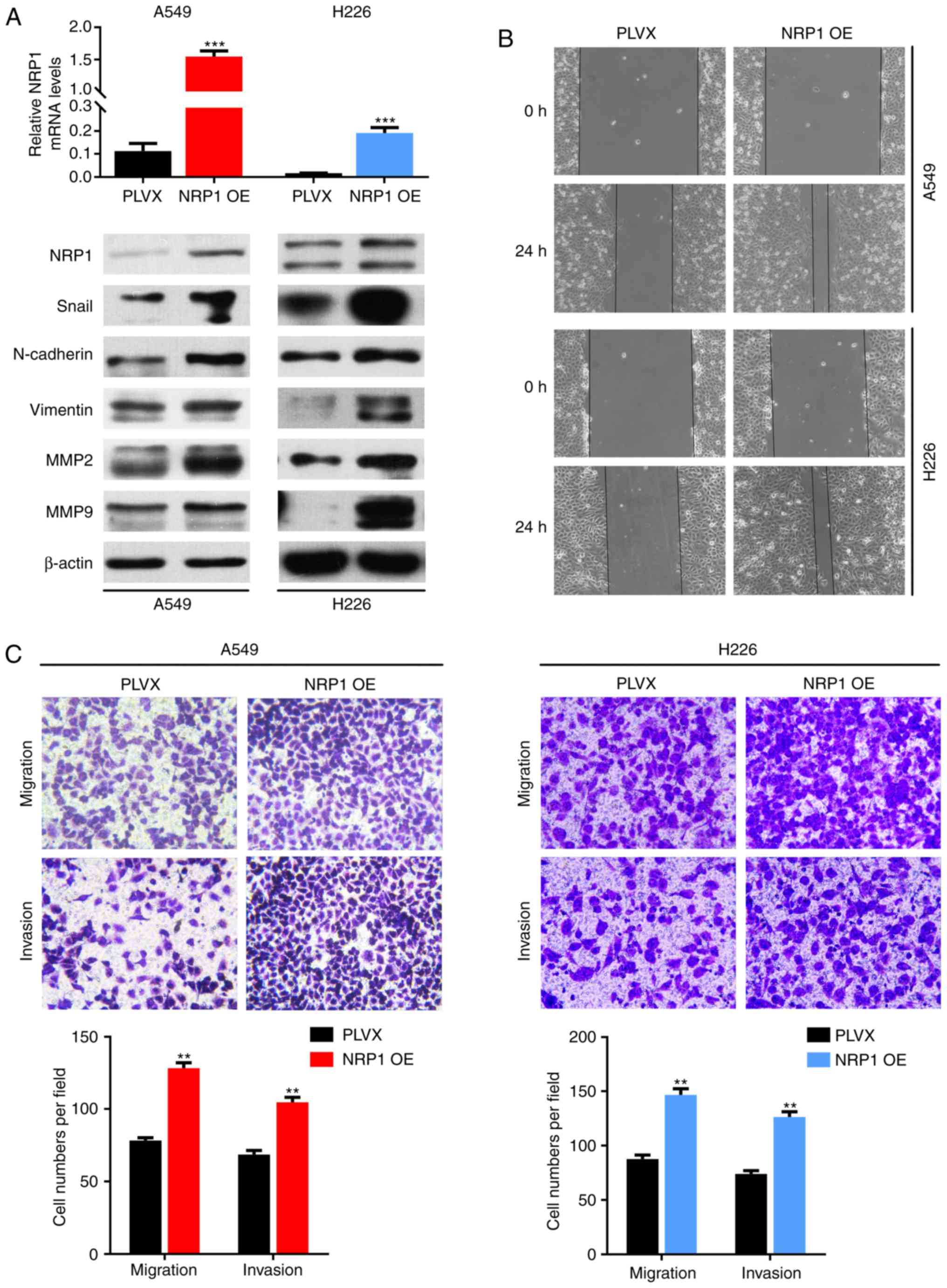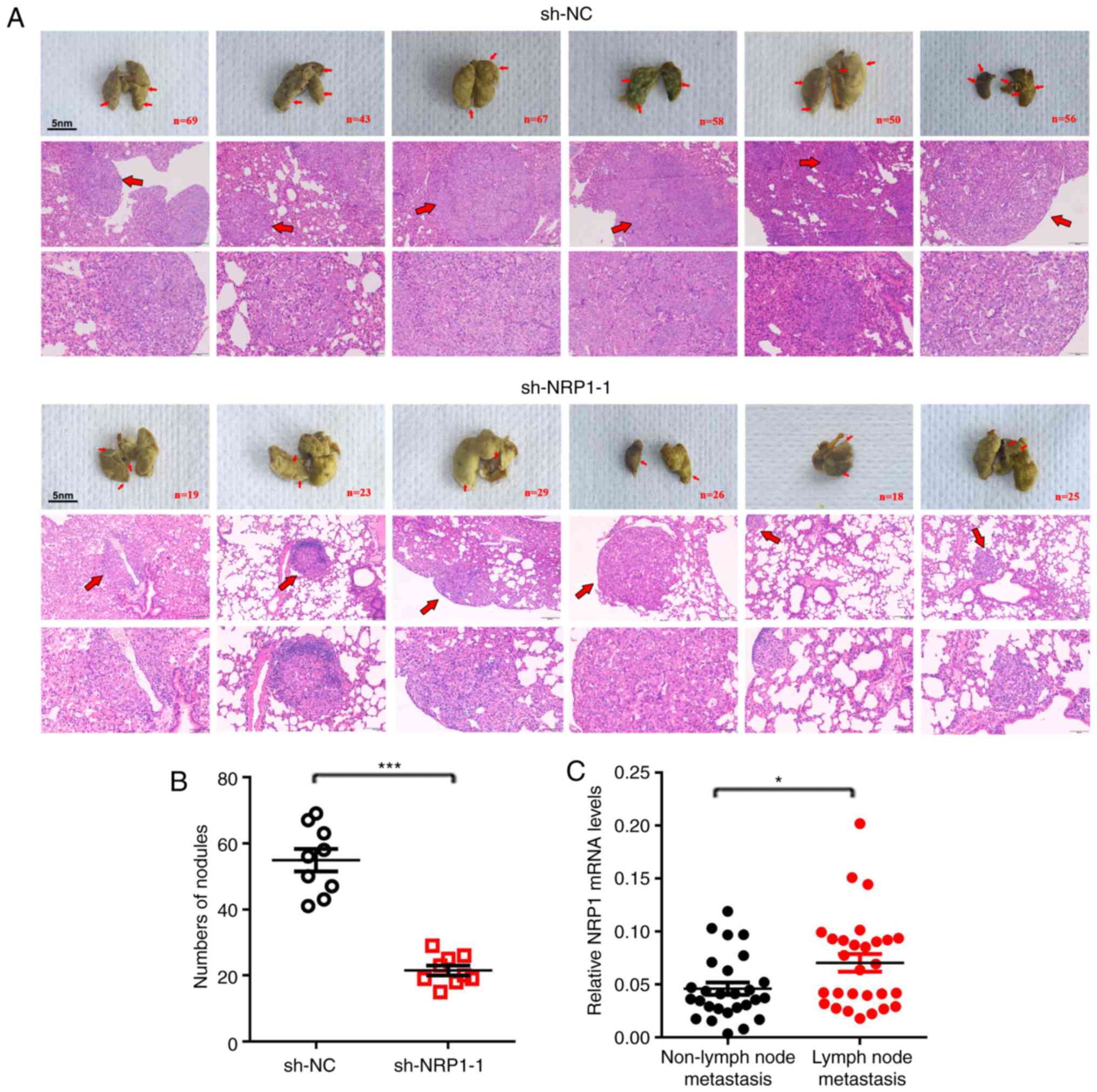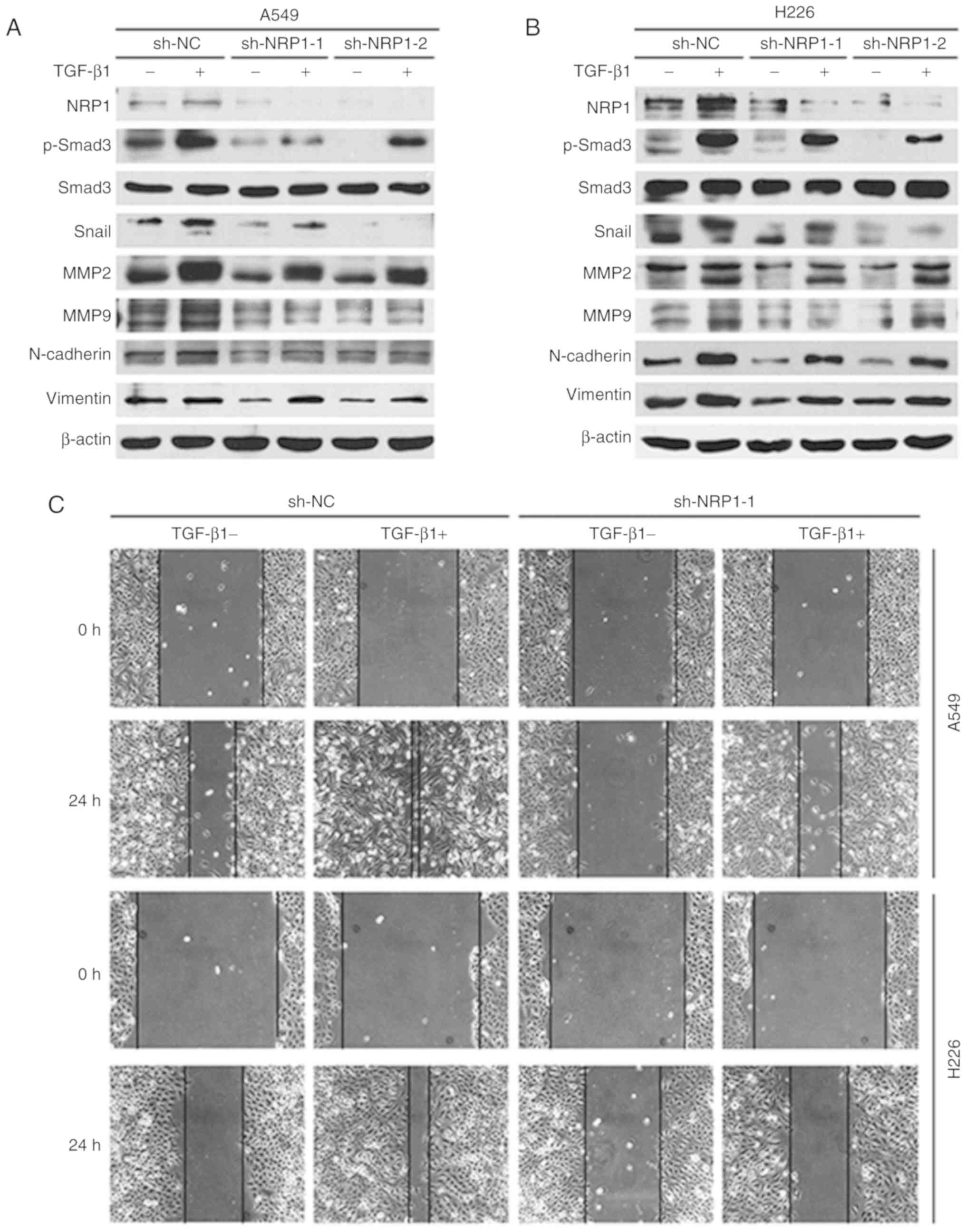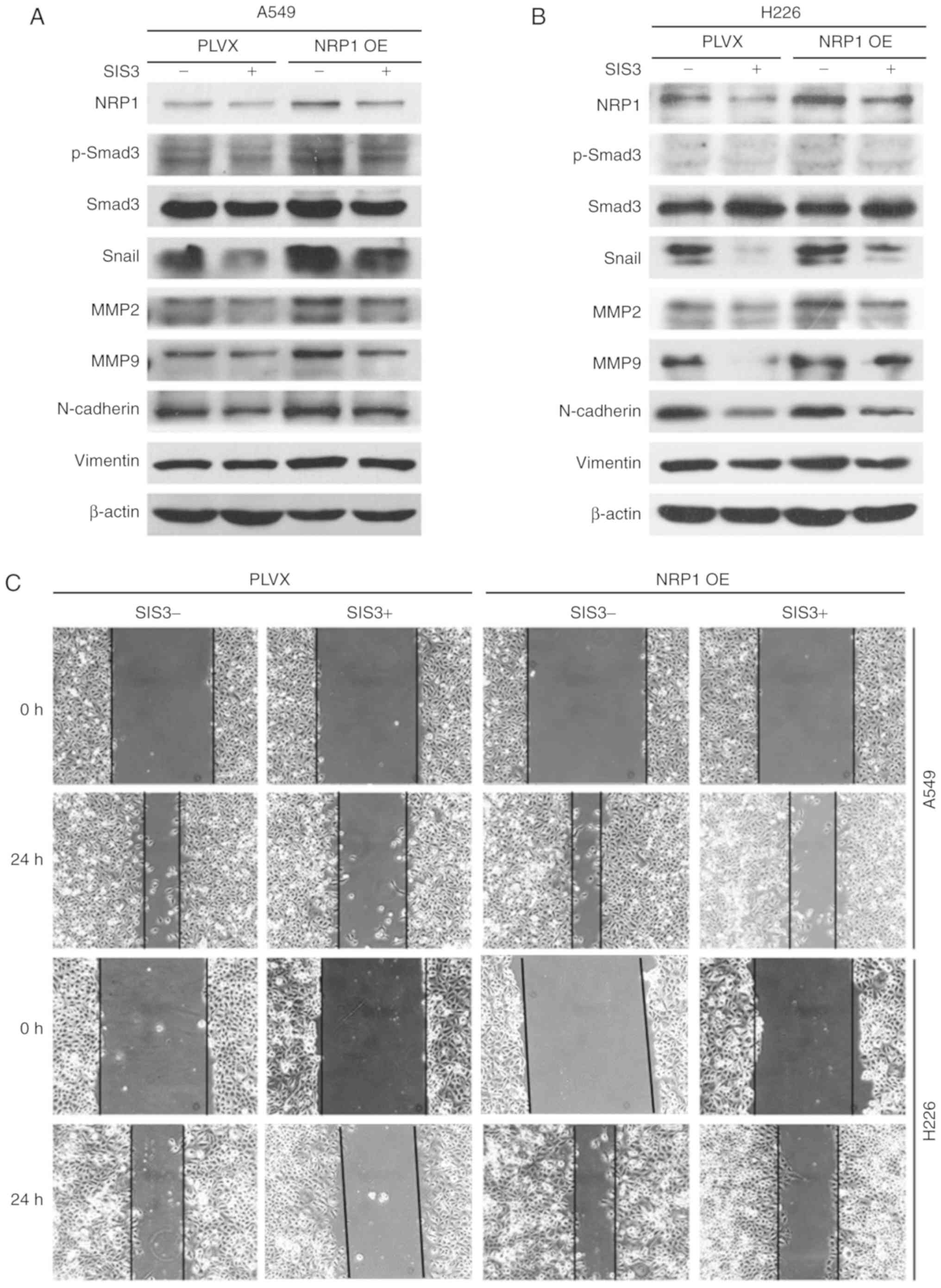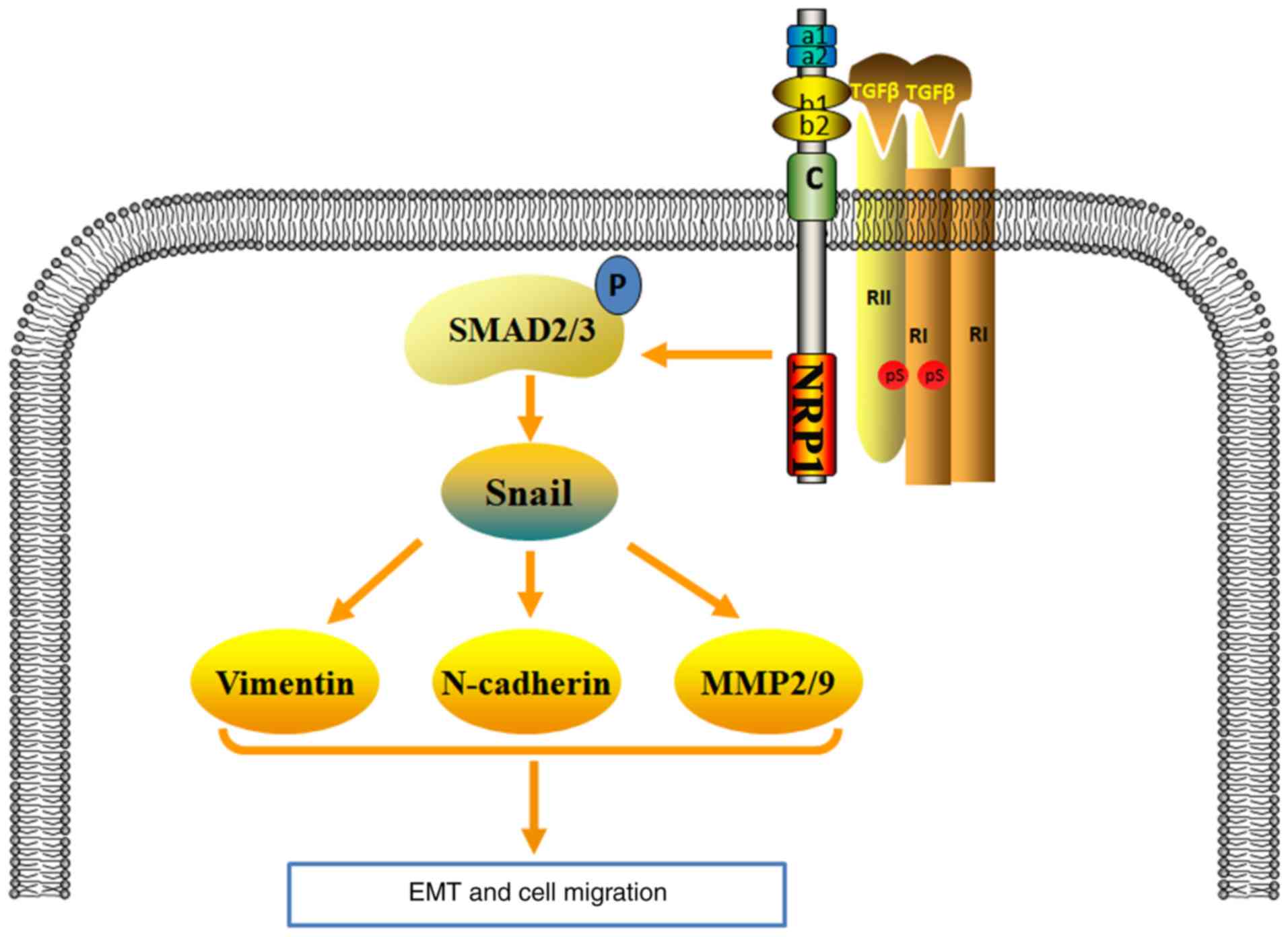|
1
|
Siegel RL, Miller KD and Jemal A: Cancer
Statistics, 2017. CA Cancer J Clin. 67:7–30. 2017. View Article : Google Scholar
|
|
2
|
Wang T, Nelson RA, Bogardus A and Grannis
FW Jr: Five-year lung cancer survival: Which advanced stage
nonsmall cell lung cancer patients attain long-term survival?
Cancer. 116:1518–1525. 2010. View Article : Google Scholar : PubMed/NCBI
|
|
3
|
Gupta GP and Massague J: Cancer
metastasis: Building a framework. Cell. 127:679–695. 2006.
View Article : Google Scholar : PubMed/NCBI
|
|
4
|
Aiello NM and Kang Y: Context-dependent
EMT programs in cancer metastasis. J Exp Med. 216:1016–1026. 2019.
View Article : Google Scholar : PubMed/NCBI
|
|
5
|
Gloushankova NA, Zhitnyak IY and Rubtsova
SN: Role of epithelial-mesenchymal transition in tumor progression.
Biochemistry (Mosc). 83:1469–1476. 2018. View Article : Google Scholar
|
|
6
|
Cui Q, Ren J, Zhou Q, Yang Q and Li B:
Effect of asiatic acid on epithelial-mesenchymal transition of
human alveolar epithelium A549 cells induced by TGF-β1. Oncol Lett.
17:4285–4292. 2019.PubMed/NCBI
|
|
7
|
Liu Y, Xue M, Du S, Feng W, Zhang K, Zhang
L, Liu H, Jia G, Wu L, Hu X, et al: Competitive endogenous RNA is
an intrinsic component of EMT regulatory circuits and modulates
EMT. Nat Commun. 10:16372019. View Article : Google Scholar : PubMed/NCBI
|
|
8
|
Zhang Y, Li JH, Yuan QG, Cao G and Yang
WB: Upregulation of LASP2 inhibits pancreatic cancer cell migration
and invasion through suppressing TGF-β-induced EMT. J Cell Biochem.
120:13651–13657. 2019. View Article : Google Scholar : PubMed/NCBI
|
|
9
|
Batlle E and Massague J: Transforming
growth factor-β signaling in immunity and cancer. Immunity.
50:924–940. 2019. View Article : Google Scholar : PubMed/NCBI
|
|
10
|
Chiu HC, Li CJ, Yiang GT, Tsai AP and Wu
MY: Epithelial to mesenchymal transition and cell biology of
molecular regulation in endometrial carcinogenesis. J Clin Med.
8:E4392019. View Article : Google Scholar : PubMed/NCBI
|
|
11
|
Derynck R and Budi EH: Specificity,
versatility, and control of TGF-beta family signaling. Sci Signal.
12:eaav51832019. View Article : Google Scholar
|
|
12
|
Ahmadi A, Najafi M, Farhood B and
Mortezaee K: Transforming growth factor-β signaling: Tumorigenesis
and targeting for cancer therapy. J Cell Physiol. 234:12173–12187.
2019. View Article : Google Scholar
|
|
13
|
Korkut A, Zaidi S, Kanchi RS, Rao S, Gough
NR, Schultz A, Li X, Lorenzi PL, Berger AC, Robertson G, et al: A
pan-cancer analysis reveals high-frequency genetic alterations in
mediators of signaling by the tgf-β superfamily. Cell Syst.
7:422–437.e427. 2018. View Article : Google Scholar
|
|
14
|
Chen G and Ye B: The key microRNAs
regulated the development of non-small cell lung cancer by
targeting TGF-β-induced epithelial-mesenchymal transition. Comb
Chem High Throughput Screen. 22:238–244. 2019. View Article : Google Scholar
|
|
15
|
Glinka Y, Stoilova S, Mohammed N and
Prud'homme GJ: Neuropilin-1 exerts co-receptor function for
TGF-beta-1 on the membrane of cancer cells and enhances responses
to both latent and active TGF-beta. Carcinogenesis. 32:613–621.
2011. View Article : Google Scholar
|
|
16
|
Kwiatkowski SC, Guerrero PA, Hirota S,
Chen Z, Morales JE, Aghi M and McCarty JH: Neuropilin-1 modulates
TGFβ signaling to drive glioblastoma growth and recurrence after
anti-angiogenic therapy. PLoS One. 12:e01850652017. View Article : Google Scholar
|
|
17
|
Matkar PN, Jong ED, Ariyagunarajah R,
Prud'homme GJ, Singh KK and Leong-Poi H: Jack of many trades:
Multifaceted role of neuropilins in pancreatic cancer. Cancer Med.
7:5036–5046. 2018. View Article : Google Scholar : PubMed/NCBI
|
|
18
|
Prud'homme GJ and Glinka Y: Neuropilins
are multifunctional coreceptors involved in tumor initiation,
growth, metastasis and immunity. Oncotarget. 3:921–939. 2012.
View Article : Google Scholar : PubMed/NCBI
|
|
19
|
Valdembri D, Regano D, Maione F, Giraudo E
and Serini G: Class 3 semaphorins in cardiovascular development.
Cell Adh Migr. 10:641–651. 2016. View Article : Google Scholar : PubMed/NCBI
|
|
20
|
Peng K, Bai Y, Zhu Q, Hu B and Xu Y:
Targeting VEGF-neuropilin interactions: A promising antitumor
strategy. Drug Discov Today. 24:656–664. 2019. View Article : Google Scholar
|
|
21
|
McGowan SE and McCoy DM: Neuropilin-1 and
platelet-derived growth factor receptors cooperatively regulate
intermediate filaments and mesenchymal cell migration during
alveolar septation. Am J Physiol Lung Cell Mol Physiol.
315:L102–L115. 2018. View Article : Google Scholar : PubMed/NCBI
|
|
22
|
Ding Z, Zhu J, Zeng Y, Du W, Zhang Y, Tang
H, Zheng Y, Qin H, Liu Z and Huang JA: The regulation of Neuropilin
1 expression by miR-338 3p promotes non-small cell lung cancer via
changes in EGFR signaling. Mol Carcinog. 58:1019–1032. 2019.
View Article : Google Scholar : PubMed/NCBI
|
|
23
|
Kitsukawa T, Shimizu M, Sanbo M, Hirata T,
Taniguchi M, Bekku Y, Yagi T and Fujisawa H: Neuropilin-semaphorin
III/D-mediated chemorepulsive signals play a crucial role in
peripheral nerve projection in mice. Neuron. 19:995–1005. 1997.
View Article : Google Scholar : PubMed/NCBI
|
|
24
|
Chen H, Chedotal A, He Z, Goodman CS and
Tessier-Lavigne M: Neuropilin-2, a novel member of the neuropilin
family, is a high affinity receptor for the semaphorins Sema E and
Sema IV but not Sema III. Neuron. 19:547–559. 1997. View Article : Google Scholar : PubMed/NCBI
|
|
25
|
Matsushita A, Gotze T and Korc M:
Hepatocyte growth factor-mediated cell invasion in pancreatic
cancer cells is dependent on neuropilin-1. Cancer Res.
67:10309–10316. 2007. View Article : Google Scholar : PubMed/NCBI
|
|
26
|
Jubb AM, Strickland LA, Liu SD, Mak J,
Schmidt M and Koeppen H: Neuropilin-1 expression in cancer and
development. J Pathol. 226:50–60. 2012. View Article : Google Scholar
|
|
27
|
Vivekanandhan S and Mukhopadhyay D:
Genetic status of KRAS influences transforming growth factor-beta
(TGF-β) signaling: An insight into Neuropilin-1 (NRP1) mediated
tumorigenesis. Semin Cancer Biol. 54:72–79. 2019. View Article : Google Scholar
|
|
28
|
Jia H, Cheng L, Tickner M, Bagherzadeh A,
Selwood D and Zachary I: Neuropilin-1 antagonism in human carcinoma
cells inhibits migration and enhances chemosensitivity. Br J
Cancer. 102:541–552. 2010. View Article : Google Scholar : PubMed/NCBI
|
|
29
|
Boschetti G, Kanjarawi R, Bardel E,
Collardeau-Frachon S, Duclaux-Loras R, Moro-Sibilot L, Almeras T,
Flourie B, Nancey S and Kaiserlian D: Gut inflammation in mice
triggers proliferation and function of mucosal foxp3+
regulatory T cells but impairs their conversion from
CD4+ T cells. J Crohns Colitis. 11:105–117. 2017.
View Article : Google Scholar
|
|
30
|
Lampropoulou A and Ruhrberg C: Neuropilin
regulation of angiogenesis. Biochem Soc Trans. 42:1623–1628. 2014.
View Article : Google Scholar : PubMed/NCBI
|
|
31
|
Plein A, Fantin A and Ruhrberg C:
Neuropilin regulation of angiogenesis, arteriogenesis, and vascular
permeability. Microcirculation. 21:315–323. 2014. View Article : Google Scholar : PubMed/NCBI
|
|
32
|
Roy S, Bag AK, Singh RK, Talmadge JE,
Batra SK and Datta K: Multifaceted role of neuropilins in the
immune system: Potential targets for immunotherapy. Front Immunol.
8:12282017. View Article : Google Scholar : PubMed/NCBI
|
|
33
|
Chaudhary B, Khaled YS, Ammori BJ and
Elkord E: Neuropilin 1: Function and therapeutic potential in
cancer. Cancer Immunol Immunother. 63:81–99. 2014. View Article : Google Scholar
|
|
34
|
Sha Y, Haensel D, Gutierrez G, Du H, Dai X
and Nie Q: Intermediate cell states in epithelial-to-mesenchymal
transition. Phys Biol. 16:0210012019. View Article : Google Scholar :
|
|
35
|
Liu S, Hou H, Zhang P, Wu Y, He X, Li H
and Yan N: Sphingomyelin synthase 1 regulates the
epithelialtomesenchymal transition mediated by the TGFβ/Smad
pathway in MDAMB231 cells. Mol Med Rep. 19:1159–1167. 2019.
|
|
36
|
Hu H, Wang M, Wang H, Liu Z, Guan X, Yang
R, Huang R, Tang Q, Zou C, Wang G, et al: MEGF6 promotes the
epithelial-to-mesenchymal transition via the TGFβ/SMAD signaling
pathway in colorectal cancer metastasis. Cell Physiol Biochem.
46:1895–1906. 2018. View Article : Google Scholar
|
|
37
|
Yin J, Wang Y, Chang J, Li B, Zhang J, Liu
Y, Lai S, Jiang Y, Li H and Zeng X: Apelin inhibited
epithelial-mesenchymal transition of podocytes in diabetic mice
through downregulating immuno-proteasome subunits β5i. Cell Death
Dis. 9:10312018. View Article : Google Scholar
|
|
38
|
Kanemaru R, Takahashi F, Kato M, Mitsuishi
Y, Tajima K, Ihara H, Hidayat M, Wirawan A, Koinuma Y, Hayakawa D,
et al: Dasatinib suppresses TGFβ-mediated epithelial-mesenchymal
transition in alveolar epithelial cells and inhibits pulmonary
fibrosis. Lung. 196:531–541. 2018. View Article : Google Scholar : PubMed/NCBI
|
|
39
|
Zhang X, Feng W, Zhang J, Ge L, Zhang Y,
Jiang X, Peng W, Wang D, Gong A and Xu M: Long noncoding RNA PVT1
promotes epithelialmesenchymal transition via the TGFβ/Smad pathway
in pancreatic cancer cells. Oncol Rep. 40:1093–1102.
2018.PubMed/NCBI
|
|
40
|
Glinka Y and Prud'homme GJ: Neuropilin-1
is a receptor for transforming growth factor beta-1, activates its
latent form, and promotes regulatory T cell activity. J Leukoc
Biol. 84:302–310. 2008. View Article : Google Scholar : PubMed/NCBI
|
|
41
|
Powell J, Mota F, Steadman D, Soudy C,
Miyauchi JT, Crosby S, Jarvis A, Reisinger T, Winfield N, Evans G,
et al: Small molecule neuropilin-1 antagonists combine
antiangiogenic and antitumor activity with immune modulation
through reduction of transforming growth factor beta (TGFβ)
production in regulatory T-cells. J Med Chem. 61:4135–4154. 2018.
View Article : Google Scholar : PubMed/NCBI
|
|
42
|
Hirota S, Clements TP, Tang LK, Morales
JE, Lee HS, Oh SP, Rivera GM, Wagner DS and McCarty JH: Neuropilin
1 balances β8 integrin-activated TGFβ signaling to control
sprouting angio-genesis in the brain. Development. 142:4363–4373.
2015. View Article : Google Scholar : PubMed/NCBI
|
|
43
|
Grandclement C, Pallandre JR, Valmary
Degano S, Viel E, Bouard A, Balland J, Remy-Martin JP, Simon B,
Rouleau A, Boireau W, et al: Neuropilin-2 expression promotes
TGF-β1-mediated epithelial to mesenchymal transition in colorectal
cancer cells. PLoS One. 6:e204442011. View Article : Google Scholar
|















